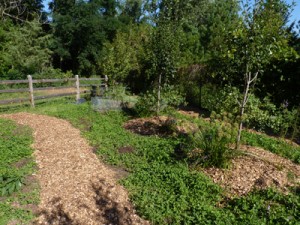Fall Samhain Moon
Spent most of the day making chicken-leek pot pies. Reading a French scholar named Bruno Latour today, for Modern and Post Modern His notion of thick description, of “gathering” the society of meanings and matters necessary to fully engage any thing, has got me excited.
(Latour)
So, just to try it out on chicken-leek pot pies, let’s play with the idea.
Leeks and Wales have a close association, like the thistle and Scotland, the shamrock and Ireland. In war Welsh soldiers would wear leeks in their bonnets, as a Lakota might an eagle feather. When this partly Welsh man genetically and Welsh named man, Ellis being Welsh and the family from Denbigh in northern Wales, sets out to make a leek pie, it is not merely a culinary but a cultural matter as well.
Perhaps it was that cultural matter that accreted years back, back when the same man decided to plant a garden. A garden. Well, there’s a thick matter. Of course there’s the obvious garden of Eden, but in order to have an idea like the garden of Eden, the ne plus ultra of gardens, we had to have the idea of garden itself.
(“The Garden of Eden” by Lucas Cranach der Ältere, a 16th-century German depiction of Eden.”
Garden is, of course, over against the life ways of the hunter-gatherers, who, in a sense, saw the whole world, or at least the part they could reach on foot, as their garden. But not exactly. Yes, they saw it as their garden, a physical place which produced food for their consumption; but no, not a garden in the horticultural meaning, that is, a cultivated (cultured) place where plants no longer grew as they would, but as a gardener wanted them to grow.
It was this horticultural understanding of garden that split us off from those early nomads and found us more or less rooted to a particular place so we could, as Voltaire recommended, tend our garden. It’s that sense of a place chosen and planted, rather than one identified and harvested, that is behind the garden on our property.
In that garden, a human defined and cared for instance of the earth’s most basic life  sustaining work, the growing of food, this Welsh descended man chose a plant regarded by his genetic ancestors as central somehow to their identity. “According to legend, Saint David (the patron saint of Wales[2]) ordered his Welsh soldiers to identify themselves by wearing the vegetable on their helmets in an ancient battle against the Saxons that took place in a leek field.” Wikipedia
sustaining work, the growing of food, this Welsh descended man chose a plant regarded by his genetic ancestors as central somehow to their identity. “According to legend, Saint David (the patron saint of Wales[2]) ordered his Welsh soldiers to identify themselves by wearing the vegetable on their helmets in an ancient battle against the Saxons that took place in a leek field.” Wikipedia
Cooking too is a marker of one era of human evolution from another. Levi Strauss, the French anthropologist wrote a famous book, “The Raw and the Cooked,” which explored this binary. Cooking helps detoxify food, makes it more flavorful and allows for the mixing of ingredients. We don’t bring the leeks in, chop them up and eat them. Most of the allium family shallots, onions, garlic, leeks aren’t considered raw vegetables (except in salads and on sandwiches) by most Westerners, but here again we enter the domain of culture, choosing which food will be eaten in which way.
And the chicken. Well. Once the gardens got going, the domestication of animals was not far behind, probably led by the dog, but followed later by fowl, hogs, cattle, sheep and all the others that now find their place primarily in human defined environments. Early folks gathered a few scrawny birds and enclosed them somehow, perhaps initially for their eggs. Later, they ate them. Or, the reverse. I don’t know.
(Gallus_gallus ancestor of the domestic chicken)
In Wales, and I imagine in other Celtic countries, poverty made chicken a primary meat, if any meat was available at all. In Wales it’s perhaps no surprise that someone decided to cook chicken and leeks together. Tasty. Just when that combination became a pie, again, I don’t know. But I do know that 8 instances of its most recent incarnation are on the counter upstairs, one of which will be cut open tonight for supper.
Lots more could be added here to a thick description of chicken-leek pie. We could, for example, explore gender roles, the chicken industry, the Viking stove folks, the domestic natural gas industry, the lights that allowed the cooking to go on after the sun went down. There’s flour milling and grain cultivation, too. Not to mention the corn and peas, frozen, in this instance which brings up refrigeration. This idea has some legs, I think.
